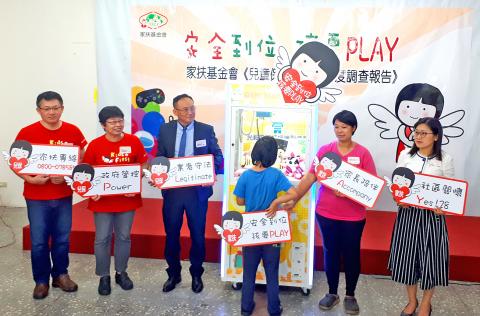More than half of children walk past one to five claw machines on their way to school and nearly 20 percent said they have seen merchandise that makes them feel uncomfortable in such machines, a Taiwan Fund for Children and Families survey found.
The number of claw machine stores has more than tripled from 920 in 2016 to 3,353 this year, Ministry of Finance statistics showed.
As such establishments become increasingly common, it is necessary to consider their effects on children’s physical and mental development, and the experiences they offer them, fund executive director Betty Ho (何素秋) told a news conference yesterday.

Photo: CNA
To better gauge their effects, the fund between April 25 and May 31 conducted an online survey on claw machines among children aged seven to 18 and collected 1,884 valid responses, fund social work section chief Chou Ta-yao (周大堯) said.
The survey found that 32.7 percent of children play a claw machine game one to three days per week, 6.8 percent play with one four to six days per week and 4.1 percent do it every day, Chou said.
While 52.9 percent said they walk past one to five claw machines on their way to school, 48.1 percent who play with them say they mostly do so over the weekend, he said.
Seven percent of children said they stay at a claw machine store — which are usually always open — past 10pm and 37 percent said they keep playing until they get the item that they want, he said.
While 19.7 percent said they have seen merchandise that makes them feel uncomfortable in claw machines, 4.9 percent said they have been harassed or bullied, or got into fights at a claw machine arcade, he said.
“Children have the right to engage in play and recreational activities appropriate to their age, as specified in Article 31 of the UN Convention on the Rights of the Child,” Ho said. “Playing allows children to cultivate their creativity and imagination, become more sympathetic, improve their dexterity and develop more confidence.”
However, children need guidance when playing to prevent harm and in the case of claw machines, because when unsupervised, some children might spend more money than they should, she said.
While there are strict laws and regulations governing the management of arcades and merchandise that can be displayed in public, such as the Electronic Game Arcade Business Regulation Act (電子遊戲場業管理條例) and the Protection of Children and Youths Welfare and Rights Act (兒童及少年福利與權益保障法), the survey showed that inappropriate merchandise can still be found in some machines, she said.
The government should step up enforcement of claw machine regulations and allow children to enjoy games in safer environments, she said.

Taiwan is stepping up plans to create self-sufficient supply chains for combat drones and increase foreign orders from the US to counter China’s numerical superiority, a defense official said on Saturday. Commenting on condition of anonymity, the official said the nation’s armed forces are in agreement with US Admiral Samuel Paparo’s assessment that Taiwan’s military must be prepared to turn the nation’s waters into a “hellscape” for the Chinese People’s Liberation Army (PLA). Paparo, the commander of the US Indo-Pacific Command, reiterated the concept during a Congressional hearing in Washington on Wednesday. He first coined the term in a security conference last

Prosecutors today declined to say who was questioned regarding alleged forgery on petitions to recall Democratic Progressive Party (DPP) legislators, after Chinese-language media earlier reported that members of the Chinese Nationalist Party (KMT) Youth League were brought in for questioning. The Ministry of Justice Investigation Bureau confirmed that two people had been questioned, but did not disclose any further information about the ongoing investigation. KMT Youth League members Lee Hsiao-liang (李孝亮) and Liu Szu-yin (劉思吟) — who are leading the effort to recall DPP caucus chief executive Rosalia Wu (吳思瑤) and Legislator Wu Pei-yi (吳沛憶) — both posted on Facebook saying: “I

The Ministry of Economic Affairs has fined Taobao NT$1.2 million (US$36,912) for advertisements that exceed its approved business scope, requiring the Chinese e-commerce platform to make corrections in the first half of this year or its license may be revoked. Lawmakers have called for stricter enforcement of Chinese e-commerce platforms and measures to prevent China from laundering its goods through Taiwan in response to US President Donald Trump’s heavy tariffs on China. The Legislative Yuan’s Finance Committee met today to discuss policies to prevent China from dumping goods in Taiwan, inviting government agencies to report. Democratic Progressive Party Legislator Kuo Kuo-wen (郭國文) said

The Ministry of Economic Affairs has fined Taobao NT$1.2 million (US$36,900) for advertisements that exceeded its approved business scope and ordered the Chinese e-commerce platform to make corrections in the first half of this year or its license would be revoked. Lawmakers have called for stricter supervision of Chinese e-commerce platforms and more stringent measures to prevent China from laundering its goods through Taiwan as US President Donald Trump’s administration cracks down on origin laundering. The legislature’s Finance Committee yesterday met to discuss policies to prevent China from dumping goods in Taiwan, inviting government agencies to report on the matter. Democratic Progressive Party